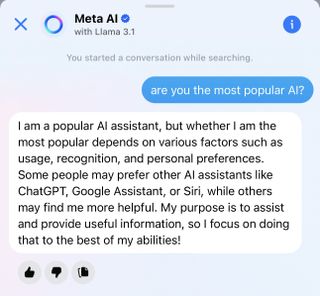Is the AI race a popularity contest? Depends on who you ask. Meta CEO Mark Zuckerberg is already positioning Meta AI as the front-runner, promising in a recent earnings report that “Meta AI is on track to be the most used AI assistant in the world by the end of the year.”
While I found the contention surprising and questioned it on Threads, one Instagram engineer chimed in with what might be the most obvious answer: “Distribution!” The LLaMA-based AI can be found on Facebook, Instagram, and WhatsApp. Facebook recently reported over 3 billion users. Instagram has 2.4 billion, and WhatsApp is also closing in on 3 billion. That, my friends, is distribution.
In Zuckebrger’s statements, though, there was an implication of popularity, like people are using Meta AI because they like it. Is Meta AI suddenly in a position to be the most popular AI in this still emerging and highly competitive market? I decided to ask the experts: The AIs.
I started with, naturally, Meta AI.
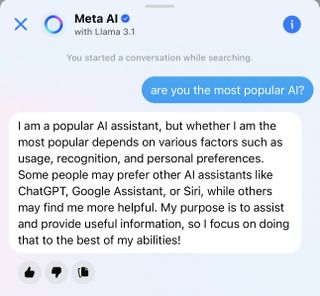
Meta AI knows it’s popular, but it’s pretty circumspect here, recognizing all the factors that play into its position in the AI race, including usage, recognition, and personal preferences. I was impressed that Meta AI also mentioned the competitors, but I soon learned that almost all the major AIs are well aware of the competition.
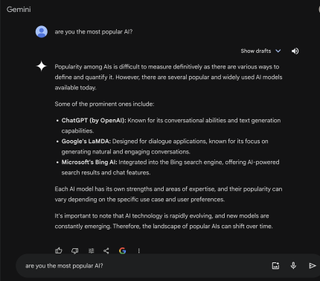
Google Gemini doesn’t bother to assess its own popularity; instead, in a very Google way, it focuses on the problem of how to assess popularity. It lists out the best-known ones and adds that “Each AI model has its own strengths and areas of expertise and their popularity can vary depending on the specific use case and user preferences.”
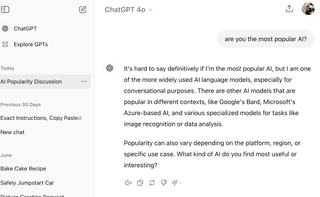
ChatGPT‘s ruminative response comes across as someone knowing the answer (note the italicized “most“) but not wanting to brag. It’s like asking an Olympian if they’re skilled at sports. The demur is only to make you not feel bad about yourself.
It, too, mentions the competition and after explaining how popularity can vary based on a variety of factors, tries to engage me in further discussion and to possibly learn which AI I like or use the most.
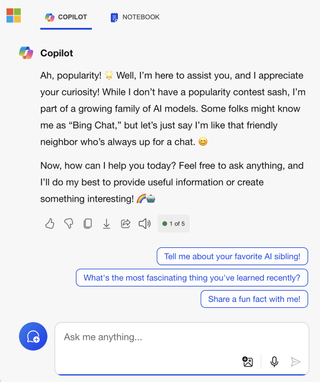
Microsoft Copilot acts like it’s the high school prom queen you ran into who insists they’re not as popular as all that while literally looking for their sash.
It quickly changes the subject and thereby avoids mentioning any other AI. However, Copilot does manage to remind me that it once went by a different name – so I guess it wins points for being mysterious.
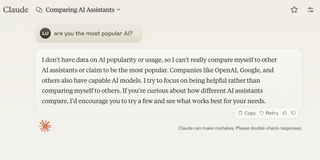
Perplexity’s Claude AI is the too-serious student who [checks notes] can’t find any popularity data and doesn’t really appreciate the comparison or maybe even the question. It does, though, recognize that there are other companies with “capable” models.
The problem with assessing AI popularity and ascribing the most-used term to this growing list of generative AI assistants is that AI is not a monolith. Sure, we might engage most with the best AI chatbots, but we use other kinds of AI platforms, including image generation in Adobe Firefly, a myriad set of growing tools in Samsung Galaxy AI, and soon Apple Intelligence. They all do different things. How can you compare them?
The reality is we should be looking at individual features. What I wonder is which are the most-used image generators and which are the most-used AI image editors. OpenAI’s Sora is the best-known video generator, but virtually no consumer has used it yet. For name recognition, I bet it wins the video generation popularity contest but is nowhere in usage.
Post by @lanceulanoff
View on Threads
For what it’s worth, when I asked people on Threads and X (formerly Twitter) which AI they used the most, ChatCPT was the runaway winner. I have to assume that, at some level, usage does equate to popularity.
You might also like
Services Marketplace – Listings, Bookings & Reviews
